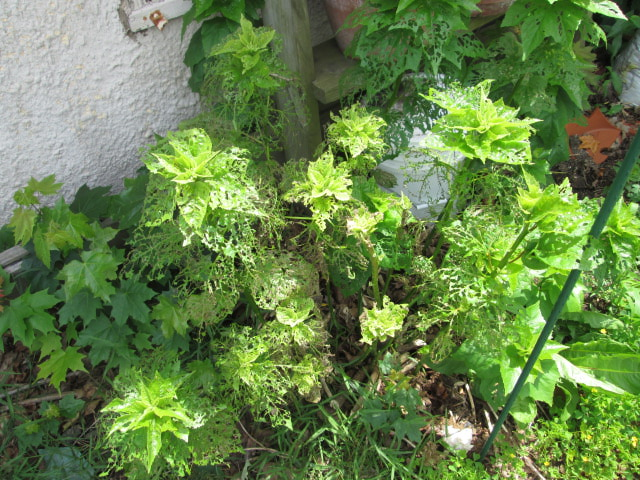QuestionQUESTION: How safe is insecticidal soap on perennial hibiscus (rose mallow)? The time I used it all of the leaves dropped. Is it best to combine it with neem oil? Thanks!
ANSWER: Hello John,
I have grown Lord and Lady Baltimore - loved them both.
Normally, insecticidal soap is one of the safest substances you can use, but there are a few issues of concern. Sometimes when something is known to be safe, we (OK, I've done it!) don't worry about any downsides.
Avoid spraying when the temperature if 85 degrees or above. (I know that's a pain - you see a bug, you want to get rid of it, not take the temperature!)
Do not spray when the relative humidity is over 90%.
Don't spray dry or moisture starved leaves - it can burn them. Try to always water plants, or wait until after it rains, to apply anything to them, even benign substances.
Avoid treating plants in direct sun - applications early morning or evening are best.
Since oil can burn in heat it is probably better to just use the insecticidal soap. And it's sometimes better (and more economical!) to use one thing at a a time.
And lastly, if you are mixing from a concentrate, make sure that it is properly diluted.
Do any of the things on this list sound familiar? Is this helpful?
Please feel free to write again with any more questions or concerns.
Regards,
Donna
---------- FOLLOW-UP ----------
QUESTION: Hi Donna!
I have a 3' tall young brugmansia which. during the winter indoors, was affected by, I think, spider mites and so I removed all of the foliage. Now the plant is outside and has sent up several healthy shoots from the base. However, no foliage is appearing on the tall stalk. Should I snip the new shoots to encourage regrowth on the bare stalk or allow one or more of the new shoots to grow? Thanks!
ANSWER: Hello again!
I love brugs. I overwintered one for several years.
In this case, I think patience is king. I love to DO SOMETHING but I think that the best thing for you to do is watch and wait. Your plant is producing healthy shoots from the base? Bravo! Looking good.
I would let the plant develop further. I think that's the best course.
We love the same plants.
Regards,
Donna
---------- FOLLOW-UP ----------
 Rose Mallow Damage
Rose Mallow Damage
QUESTION: Hi Donna!
I'm having trouble defeating the hibiscus sawfly larvae on my Rose Mallow. I have tried insecticidal soap and neem oil, separately and in combination, but the damage continues. One of my three plants is almost totally reduced to laced out foliage. Can you suggest a better spray to use. Also, I am thinking I might cut the plant back to just above the soil and let it grow back. I might recover and have a later bloom. What say you?
John
AnswerHello again, John.
I am having the same issue. It affects my roses. They are sawflies. I never had them before this year. Lots of people in my neighborhood are having trouble with them.
Firstly, please let me tell you that your plants will recover. Several of my roses looked quite awful - skeletonized and brown. They have now recovered. I cut off the icky sections.
Let's go organic first, which I did, and which I think worked. Have you heard of spinosad? Several companies are marketing insect controls with Spinosad as the primary active ingredient. It's a biological bacterium agent created by fermentation that primarily affects chewing insects. I went to my garden center last year seeking something that would not harm bees. It is sold under several names; I use Monterey Garden Spray. (It is also sold as Captain Jack's Deadbug Brew - it's the same thing, but what a name!) You have to use it more than once - three times seemed to do it. And please use it at night because it can harm bees if used during the daytime. But it works! It's natural, and it's safe for you and the bees if you use it at night. It has taken care of the chewers of some of my nepeta as well as my roses.
And, by the way,BT does not work on this.
You can get it at any garden center, and you can order it from Amazon.
Option two is acephate, which affects chewers. It also works on thrips, and you don't have to reapply it, because it is a systemic. I use it to keep thrips from ruining my peonies. There are other things that work, but they are bad for the bees, the environment, or you!
So please try the spinosad. At night. For three days.
Nice to work with you again!
Best wishes,
Donna






